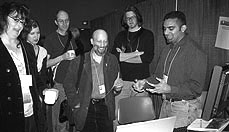My Evidence: Who's the authority here? 
David Beck, Exploratorium, USA
Valerie Knight-Williams, Knight-Williams Research Communications, USA
Lowell Robinson, Exploratorium, USA
Pearl Tesler, Exploratorium, USA
http://www.exploratorium.edu
"I believe the earth travels around the sun." Today we can say this with collective confidence, but four hundred years ago, Galileo was tried and convicted for this statement. Seeking an audience for his then-radical ideas, Galileo authored a book, Dialogue Concerning the Two Chief World Systems, intended for the public as well as his peers. It reads as a conversation between two philosophers, allowing the reader to be a fly on the wall of scientific discourse.
If Galileo were alive today, he'd probably have a blog. What better way to reach the masses? Touted as the great equalizing platform of information, the Web's multiplicity of voices destabilizes authority, yet this destabilization cuts both ways. On the Web, we find true alongside false, valid amid invalid, fact next to fiction. The abundance of information there is a dubious feast, leaving users with the important responsibility of deciding what to believe and what not to believe.
Knowledge construction is the heart of the Exploratorium's latest project, called Evidence. The project probes the foundations of science in addressing one simple question: How do we know what we know? How do we choose what to believe?
My Evidence is an online application developed for the Evidence project intended to help online users to better understand their own belief systems and processes of knowledge construction, as well as those of their peers. My Evidence begins by posing a series of statements on screen, such as, "I believe the world is spinning." A user chooses from among these and proceeds to create their evidence map, a visual tool that helps a user categorize their knowledge according to how it was acquired. As a user enters more and more data, patterns in their growing evidence map give insights into what is personally salient to them in their own knowledge construction. My Evidence also allows users to compare their evidence maps to other users' maps.
The purpose of this mini workshop is to take a closer look at how the Exploratorium developed this online application from its conceptual inception to its technical deployment. We will focus on online learning using Web 2.0 applications and the various pitfalls that accompany this lofty goal. Workshop participants will: 1) find out how we tested this with users during the development process, and what we did as a result of their feedback; 2) participate in a discussion about how to develop interactive offerings about abstract ideas; and 3) have the opportunity to construct, share, and save their own maps in My Evidence.
Mini-Workshop: My Evidence [Contributed Content]
Keywords: on-line community, Web 2.0, creative process, interface design, database, scientific evidence, design process
